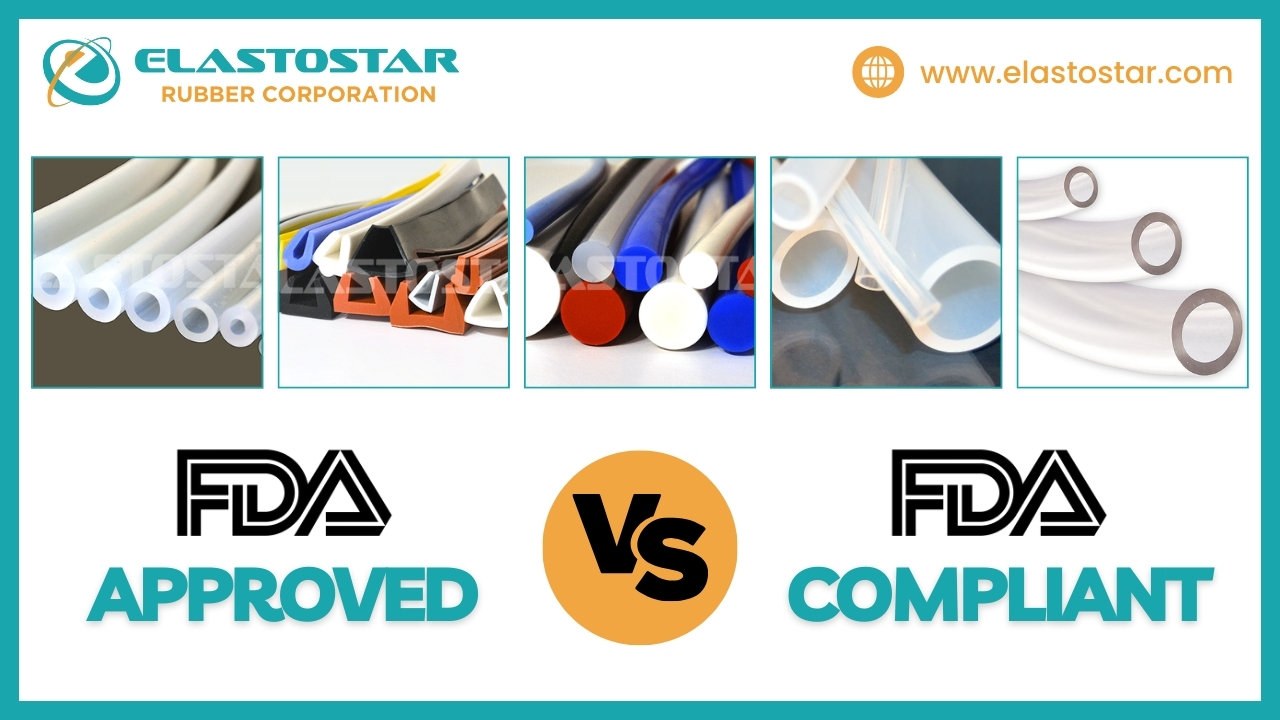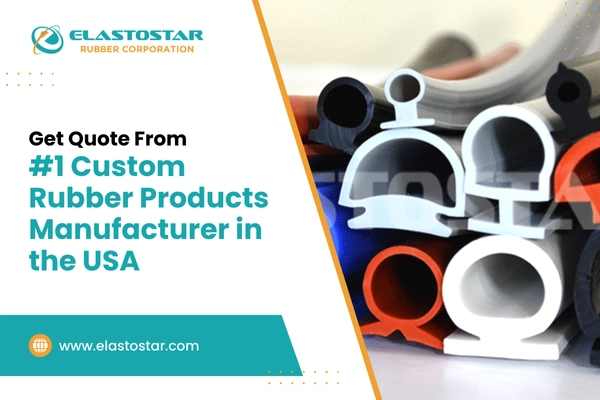When it comes to products like silicone rubber gaskets and silicone seals, understanding the difference between FDA- approved and FDA- compliant can be confusing but important. These terms are more than just bureaucratic jargon; they impact the safety, quality, and trustworthiness of products we use daily.
This blog will break down what it means to be US FDA registered, explore the steps to get FDA approval for a product and clarify the differences between FDA-approved and FDA-registered. By the end, you’ll have a clearer understanding of these terms and their implications for products made with silicone materials.
Table of Contents
What is FDA Approval?
FDA-approval signifies that the U.S. Food and Drug Administration (FDA) has thoroughly evaluated a product, typically a drug, medical device, or food additive, and determined that it is safe and effective for its intended use. The approval process involves rigorous testing, clinical trials, and a detailed review of the product’s safety and efficacy data.
According to the FDA, only about 8% of drugs that enter clinical trials ultimately receive FDA approval. This highlights the stringent standards and rigorous scrutiny involved in the approval process. In 2022, the FDA approved 50 novel drugs, a testament to the thorough evaluation each product undergoes.
What is FDA Compliance?
FDA compliance refers to products that meet the specific regulations and standards set by the FDA for their category. Unlike FDA approval, which involves an extensive review process, FDA compliance indicates that the product adheres to the guidelines and requirements necessary for its safe use.
The Role of FDA Certification
FDA certification plays a significant role in establishing a product’s compliance or approval status. For materials like silicone material, obtaining FDA certification ensures that the product meets the necessary standards for its intended use. For example, a silicone material used in medical implants must be certified to ensure it is safe for long-term contact with human tissue.
Importance of FDA Certification
- Assurance of Safety: FDA certification assures that the product has been evaluated for safety and compliance with relevant regulations.
- Market Access: FDA certification can be a prerequisite for marketing products in the United States and other countries that recognize FDA standards.
- Consumer Confidence: Products with FDA certification often enjoy higher consumer trust due to their verified safety and quality.
Examples of FDA-Compliant Products
Products such as silicone sponges, silicone strips, and silicone seals can be FDA-compliant if they meet the necessary standards for use in food, medical, or pharmaceutical applications. For instance, a silicone sponge used in a bakery must comply with FDA regulations for food contact materials.
Key Differences Between FDA-Approved and FDA Compliant
Approval Process
- FDA Approved: Involves rigorous testing, clinical trials, and a comprehensive review by the FDA. It is a time-consuming and costly process.
- FDA Compliant: Requires adherence to specific FDA regulations and standards but does not involve the same level of scrutiny and review as FDA approval.
Scope
- FDA Approved: Generally applies to drugs, medical devices, and certain food additives. It indicates that the product is safe and effective for its intended use.
- FDA Compliant: Applies to a broader range of products, including materials and components used in food processing, medical devices, and pharmaceuticals. Compliance means the product meets the necessary safety and quality standards.
How to Get FDA Approval for a Product
If you are considering bringing a new product to market and wondering how to get FDA approval for a product, the process can be extensive. It typically involves several steps, including:
- Research and Development: Developing a product that meets FDA standards.
- Pre-market Approval: Submitting a pre-market approval application, which includes detailed product information, manufacturing processes, and safety data.
- Clinical Trials: Conducting clinical trials to demonstrate the product’s safety and efficacy.
- FDA Review: Undergoing a thorough review by FDA scientists and regulatory experts.
- Approval: Receiving FDA approval if the product meets all required standards.
This process can be particularly rigorous for medical devices and pharmaceuticals but is less intensive for products like silicone seals and silicone material used in less critical applications.
FDA Compliance in Silicone Rubber Gaskets and Seals
For products like silicone rubber gaskets and silicone seals, being FDA compliant often means that the materials used meet the necessary safety standards for food contact. These products are critical in ensuring that no harmful substances migrate from the gasket or seal into food or beverages. FDA compliant silicone materials are designed to withstand various conditions without degrading or contaminating the product they come into contact with.
Importance of FDA Compliance for Silicone Products
Silicone products like silicone sponge, silicone rubber gaskets, and silicone strips are widely used in industries. They range from healthcare to food production. Ensuring these products are FDA compliant is critical to maintaining safety standards. FDA compliance means that the materials used meet specific guidelines set forth by the FDA, particularly regarding food contact substances. This compliance is often sufficient for many applications. Thus providing a level of assurance that the product is safe for use as intended.
Examples in Silicone Products
- Silicone Sponge: An FDA-compliant silicone sponge used in food processing must meet regulations for food contact materials but does not require the same approval process as a new drug.
- Silicone Strip: FDA-compliant silicone strips used in medical devices must adhere to standards for biocompatibility and safety.
- Silicone Seals: Silicone seals used in pharmaceutical packaging must comply with FDA regulations to ensure they do not contaminate the products they are intended to protect.
Why Understanding the Difference Matters
Knowing the difference between FDA-approved and FDA-compliant is crucial for manufacturers, consumers, and regulatory professionals. For manufacturers, ensuring that their products meet the appropriate standards can prevent costly recalls and legal issues. For consumers, understanding these terms helps in making informed choices about the safety and efficacy of the products they use.
Elastostar’s Commitment to Quality
Elastostar offers a range of FDA-approved silicone products tailored for various industries, including food, medical, and pharmaceutical sectors. Their products, such as silicone sponge, silicone strip, and silicone seals, meet the highest standards of safety and performance, ensuring that customers receive reliable and high-quality solutions for their specific needs.
Recommended Reads

Conclusion
Understanding the differences between FDA-approved and FDA-registered is essential for anyone involved in manufacturing or using silicone products like silicone rubber gaskets, silicone sponges, and silicone strips.
While FDA registration ensures that a company adheres to regulatory standards, FDA approval provides a higher level of assurance regarding the product’s safety and efficacy.
Ensuring FDA compliance is vital for maintaining the safety and integrity of products, particularly those used in the food and healthcare industries.
FAQs
1. Is FDA Approved the Same as FDA Compliant?
At Elastostar, we know the importance of understanding the difference between FDA-approved and FDA-compliant. While these terms are often confused, they are not the same. FDA-approved means that the FDA has rigorously tested and evaluated a product for safety and efficacy. It is crucial for medical devices and pharmaceuticals. FDA-compliant refers to products that meet specific FDA guidelines and standards for safety, like our silicone rubber gaskets and silicone seals. Elastostar ensures our products meet these compliance standards, providing safety and reliability.
2. What Is FDA Compliance?
FDA compliance at Elastostar means that our products, such as silicone sponges and silicone strips, adhere to the guidelines set by the FDA. This includes the materials that come into contact with food or are used in medical applications. Compliance ensures that our silicone materials are safe, durable, and effective for their intended use. Elastostar’s commitment to FDA compliance helps us maintain high-quality standards across our entire product line.
3. Is FDA Regulated the Same as FDA Approved?
No, FDA-regulated and FDA-approved are not the same. FDA regulated means that a product or industry falls under the jurisdiction of the FDA and must adhere to its standards and guidelines. Elastostar’s silicone rubber products are FDA-regulated, meaning we follow strict manufacturing practices to meet these guidelines. However, FDA approval implies that a specific product has been thoroughly reviewed and authorized by the FDA, typically after rigorous testing.
4. What Is FDA Approved?
FDA-approved indicates that the FDA has reviewed and authorized a product for safety and efficacy. This approval is crucial for high-risk products like medical devices and pharmaceuticals. For companies like Elastostar, seeking FDA approval involves extensive testing and documentation to ensure our products, such as certain specialized silicone seals, meet all necessary safety standards.
5. What Is FDA Certificate of Compliance?
An FDA certificate of compliance is a document that certifies a product meets the required FDA regulations and standards. At Elastostar, we provide this certificate to assure our customers that our silicone products, including silicone rubber gaskets and silicone materials, comply with FDA guidelines for safety and quality. This certificate is part of our commitment to transparency and quality assurance.



